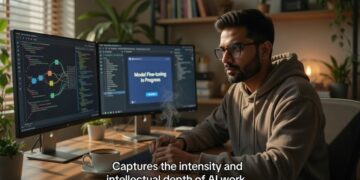In today’s digital economy, coding is more than just a technical skill—it’s a universal language of problem-solving, creativity, and innovation. Whether you’re looking to transition into a tech career, build your startup, or simply enhance your digital literacy, learning to code is an investment in your future. Fortunately, you don’t need a university degree or a hefty budget to begin. There are numerous top free platforms to learn coding online that cater to all learning levels.
This guide presents a curated list of the most effective free coding platforms available in 2025. You’ll discover their unique features, strengths, and limitations, along with a practical framework to guide your learning journey.
Why Learn Coding Online for Free?
Accessibility
Online platforms remove traditional barriers to education. Anyone with a computer and internet connection can begin learning immediately—no tuition required.
Flexibility
Self-paced courses allow you to study on your own time. Whether you’re a student, parent, or working professional, you can fit learning into your schedule.
Practical Application
Free platforms often offer hands-on coding exercises, project-based learning, and real-world simulations to ensure you’re not just learning theory but applying knowledge in practical ways.
How to Choose the Right Platform
Before selecting a platform, consider these key factors:
1. Your Career Goal
Identify whether you’re aiming to become a front-end developer, back-end engineer, data scientist, mobile app developer, or machine learning specialist. Each platform excels in different areas.
2. Learning Style
Some learners prefer interactive tutorials and coding playgrounds, while others benefit from long-form video lectures, textbooks, or community-based learning.
3. Structure vs. Flexibility
Do you need a structured curriculum, or are you comfortable picking and choosing lessons based on your interests?
4. Community Support
Platforms with active forums, mentorship, or peer feedback can significantly enhance your learning experience.
Let’s now explore the top free platforms to learn coding online that can help you achieve your goals.
1. FreeCodeCamp
Overview
FreeCodeCamp is one of the most well-known nonprofit platforms that offers thousands of coding lessons. It specializes in full-stack web development but also provides modules in data science, machine learning, and more.
Key Features
- Over 3,000 hours of coding lessons
- 10+ certification paths
- Interactive challenges and quizzes
- Projects based on real-world scenarios
- Active community forum and support
Ideal For
- Aspiring full-stack developers
- Learners seeking certification
- Project-based learners
Pros
- Free certifications
- Great portfolio-building opportunities
- Continuously updated curriculum
Cons
- Text-heavy format may not suit all learners
2. The Odin Project
Overview
The Odin Project offers a rigorous, open-source curriculum focused on web development. Its structure mirrors real-world developer workflows and encourages critical thinking and project management.
Key Features
- Covers HTML, CSS, JavaScript, Git, Node.js, and more
- Integrates GitHub for version control
- Emphasizes projects and collaborative learning
Ideal For
- Intermediate learners
- Career switchers
- Self-motivated individuals
Pros
- In-depth and challenging
- Community contributions
- Focus on employability skills
Cons
- Can be overwhelming for beginners
3. Harvard CS50 on edX
Overview
CS50 is Harvard University’s introduction to computer science. It’s available for free via edX and includes high-quality video lectures, assignments, and quizzes.
Key Features
- Taught by Professor David Malan
- Covers programming fundamentals in C, Python, and SQL
- Includes problem sets and final project
Ideal For
- Students seeking academic rigor
- Developers aiming to solidify their computer science foundation
Pros
- World-renowned reputation
- Comprehensive and in-depth
Cons
- Requires significant time and effort
4. Coursera (Audit Mode)
Overview
Coursera provides access to courses from top universities and tech companies. You can audit most courses for free and choose to pay only if you want a certificate.
Key Features
- Courses from Stanford, Google, IBM, and others
- Includes Python, web development, cloud computing, and more
- Weekly quizzes and assignments
Ideal For
- Learners seeking structured content
- Those exploring a variety of fields
Pros
- High academic quality
- Regularly updated content
Cons
- Certificates are paid
- Some features restricted in audit mode
5. Khan Academy
Overview
Khan Academy’s computing section provides beginner-friendly courses in programming, web development, and computer science fundamentals.
Key Features
- Focuses on JavaScript and HTML/CSS
- Interactive exercises and visual feedback
- No account required to start
Ideal For
- Younger learners and absolute beginners
- Visual and auditory learners
Pros
- Encouraging and supportive tone
- Accessible interface
Cons
- Less advanced content
6. Codecademy (Free Tier)
Overview
Codecademy offers interactive coding courses in multiple programming languages. Its free plan includes beginner modules and coding exercises.
Key Features
- Hands-on learning with real-time feedback
- Multiple learning paths including web development and data science
Ideal For
- Beginners exploring multiple languages
- Learners who enjoy gamified learning
Pros
- Easy-to-navigate platform
- Visual and interactive lessons
Cons
- Limited content in the free plan
7. SoloLearn
Overview
SoloLearn is a mobile-first platform that delivers bite-sized lessons in various programming languages.
Key Features
- Community discussion boards
- Leaderboards and quizzes
- Mobile and desktop access
Ideal For
- Learners who prefer short sessions
- Busy professionals
Pros
- Gamified and accessible
- Wide range of languages
Cons
- Less depth in topics
8. Mimo
Overview
Mimo is a mobile app designed for learning coding through daily challenges and micro-lessons.
Key Features
- Tracks daily progress
- Covers HTML, CSS, Python, SQL, and JavaScript
Ideal For
- Casual learners
- Beginners wanting consistent practice
Pros
- Great mobile interface
- Encourages daily learning habits
Cons
- Limited free content
9. Exercism
Overview
Exercism is a platform that offers coding exercises in over 70 programming languages. It emphasizes mentorship and best practices.
Key Features
- Community-driven feedback
- Downloadable CLI tool
- Mentor-based reviews
Ideal For
- Intermediate to advanced learners
- Developers seeking constructive feedback
Pros
- Large variety of languages
- Personal mentorship
Cons
- Less structured than course-based platforms
10. CS50x YouTube Channel
Overview
If you prefer learning through videos, Harvard’s CS50 lectures are also available on YouTube for free.
Key Features
- Full-length lectures
- Includes walkthroughs of problem sets
- Covers theoretical and practical programming concepts
Ideal For
- Visual learners
- Offline study enthusiasts
Building a Learning Plan with Free Platforms
To truly benefit from the top free platforms to learn coding online, structure your journey around clear milestones.
Step 1: Start with Basics
Begin with HTML, CSS, and JavaScript or Python. Platforms like FreeCodeCamp, Khan Academy, and SoloLearn are ideal.
Step 2: Deepen Core Knowledge
Transition to structured curricula with more depth, such as The Odin Project or CS50. Practice problem-solving using Exercism.
Step 3: Build Real Projects
Apply what you’ve learned by creating websites, applications, or automations. Host your projects on GitHub.
Step 4: Prepare for the Job Market
Take coding interview challenges (on HackerRank, Codewars), polish your resume, and create a personal portfolio site.
Maximizing Your Online Learning
- Consistency is key: Set aside dedicated time daily or weekly.
- Join communities: Reddit, Discord, and GitHub groups offer support.
- Practice regularly: Solve coding problems to reinforce knowledge.
- Apply your knowledge: Build real applications or contribute to open-source.
FAQs
Are these platforms truly free?
Yes, all platforms listed offer free access to core content. Some offer optional paid upgrades for certificates or premium content.
Can I become a professional developer using only free resources?
Absolutely. Many developers have successfully transitioned into tech roles using free platforms. Your commitment, project portfolio, and consistent practice are what truly matter.
How long will it take to get job-ready?
It varies, but with 15–20 hours per week of focused study, many learners become employable within 6–12 months.
Which platform is best for certifications?
FreeCodeCamp provides free, industry-recognized certifications. Coursera offers university-backed certificates, though they are paid.
Which is best for mobile learning?
SoloLearn and Mimo are excellent for mobile-first learners seeking daily practice.
Conclusion
Learning to code has never been more accessible. Thanks to the top free platforms to learn coding online, anyone can gain valuable programming skills without financial investment. Whether you’re a beginner exploring the basics or an advanced learner diving into new domains, these platforms provide the tools and communities to support your journey.
Choose the platforms that align with your goals, commit to regular practice, and stay curious. With determination and the right resources, you can master the art of coding and open the door to exciting opportunities in the digital world.












